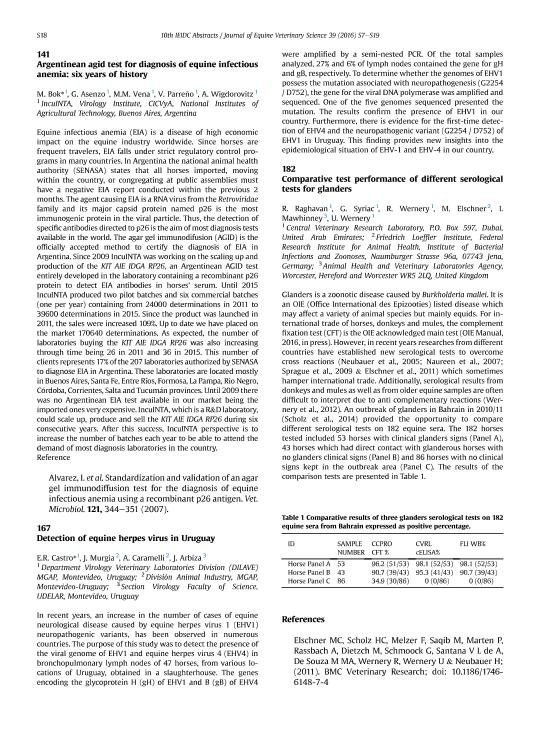Mostrar el registro sencillo del ítem
dc.contributor.author
Bok, Marina

dc.contributor.author
Asenzo, G.
dc.contributor.author
Vena, M. M.
dc.contributor.author
Parreño, V.
dc.contributor.author
Wigdorovitz, A.
dc.contributor.other
Squires, Edward L.
dc.contributor.other
Orsini, James A.
dc.contributor.other
Sgorbini, Micaela
dc.date.available
2021-07-15T14:01:37Z
dc.date.issued
2016
dc.identifier.citation
Argentinean agid test for diagnosis of equine infectious anemia: six years of history; 10th International Equine Infectious Diseases Conference; Buenos Aires; Argentina; 2016; s18
dc.identifier.issn
0737-0806
dc.identifier.uri
http://hdl.handle.net/11336/136199
dc.description.abstract
Equine infectious anemia (EIA) is a disease of high economic impact on the equine industry worldwide. Since horses are frequent travelers, EIA falls under strict regulatory control programs in many countries. In Argentina the national animal health authority (SENASA) states that all horses imported, moving within the country, or congregating at public assemblies must have a negative EIA report conducted within the previous 2 months. The agent causing EIA is a RNA virus from the Retroviridae family and its major capsid protein named p26 is the most immunogenic protein in the viral particle. Thus, the detection of specific antibodies directed to p26 is the aim of most diagnosis tests available in the world. The agar gel immunodifusion (AGID) is the officially accepted method to certify the diagnosis of EIA in Argentina. Since 2009 IncuINTA was working on the scaling up and production of the KIT AIE IDGA RP26, an Argentinean AGID test entirely developed in the laboratory containing a recombinant p26 protein to detect EIA antibodies in horses’ serum. Until 2015 IncuINTA produced two pilot batches and six commercial batches (one per year) containing from 24000 determinations in 2011 to 39600 determinations in 2015. Since the product was launched in 2011, the sales were increased 109%. Up to date we have placed on the market 170640 determinations. As expected, the number of laboratories buying the KIT AIE IDGA RP26 was also increasing through time being 26 in 2011 and 36 in 2015. This number of clients represents 17% of the 207 laboratories authorized by SENASA to diagnose EIA in Argentina. These laboratories are located mostly in Buenos Aires, Santa Fe, Entre Ríos, Formosa, La Pampa, Rio Negro, Cordoba, Corrientes, Salta and Tucum an provinces. Until 2009 there was no Argentinean EIA test available in our market being the imported ones very expensive. IncuINTA, which is a R&D laboratory, could scale up, produce and sell the KIT AIE IDGA RP26 during six consecutive years. After this success, IncuINTA perspective is to increase the number of batches each year to be able to attend the demand of most diagnosis laboratories in the country.
dc.format
application/pdf
dc.language.iso
eng
dc.publisher
Elsevier

dc.rights
info:eu-repo/semantics/openAccess
dc.rights.uri
https://creativecommons.org/licenses/by-nc-nd/2.5/ar/
dc.subject
EQUINE
dc.subject
ANEMIA
dc.subject
DIAGNOSIS
dc.subject
KIT
dc.subject.classification
Ciencias Veterinarias

dc.subject.classification
Ciencias Veterinarias

dc.subject.classification
CIENCIAS AGRÍCOLAS

dc.title
Argentinean agid test for diagnosis of equine infectious anemia: six years of history
dc.type
info:eu-repo/semantics/publishedVersion
dc.type
info:eu-repo/semantics/conferenceObject
dc.type
info:ar-repo/semantics/documento de conferencia
dc.date.updated
2021-07-05T16:40:29Z
dc.journal.volume
39
dc.journal.number
supl.
dc.journal.pagination
s18
dc.journal.pais
Estados Unidos

dc.journal.ciudad
Lexington
dc.description.fil
Fil: Bok, Marina. Instituto Nacional de Tecnología Agropecuaria. Centro de Investigación en Ciencias Veterinarias y Agronómicas. Instituto de Virología; Argentina. Consejo Nacional de Investigaciones Científicas y Técnicas; Argentina
dc.description.fil
Fil: Asenzo, G.. Instituto Nacional de Tecnología Agropecuaria. Centro de Investigación en Ciencias Veterinarias y Agronómicas. Instituto de Virología; Argentina
dc.description.fil
Fil: Vena, M. M.. Instituto Nacional de Tecnología Agropecuaria. Centro de Investigación en Ciencias Veterinarias y Agronómicas. Instituto de Virología; Argentina
dc.description.fil
Fil: Parreño, V.. Instituto Nacional de Tecnología Agropecuaria. Centro de Investigación en Ciencias Veterinarias y Agronómicas. Instituto de Virología; Argentina
dc.description.fil
Fil: Wigdorovitz, A.. Instituto Nacional de Tecnología Agropecuaria. Centro de Investigación en Ciencias Veterinarias y Agronómicas. Instituto de Virología; Argentina
dc.relation.alternativeid
info:eu-repo/semantics/altIdentifier/url/https://www.sciencedirect.com/science/article/pii/S0737080616000678
dc.relation.alternativeid
info:eu-repo/semantics/altIdentifier/doi/http://dx.doi.org/10.1016/j.jevs.2016.02.036
dc.conicet.rol
Autor

dc.conicet.rol
Autor

dc.conicet.rol
Autor

dc.conicet.rol
Autor

dc.conicet.rol
Autor

dc.coverage
Internacional
dc.type.subtype
Conferencia
dc.description.nombreEvento
10th International Equine Infectious Diseases Conference
dc.date.evento
2016-04-04
dc.description.ciudadEvento
Buenos Aires
dc.description.paisEvento
Argentina

dc.type.publicacion
Journal
dc.description.institucionOrganizadora
University of Kentucky
dc.source.revista
Journal of Equine Veterinary Science
dc.date.eventoHasta
2016-04-08
dc.type
Conferencia
Archivos asociados
